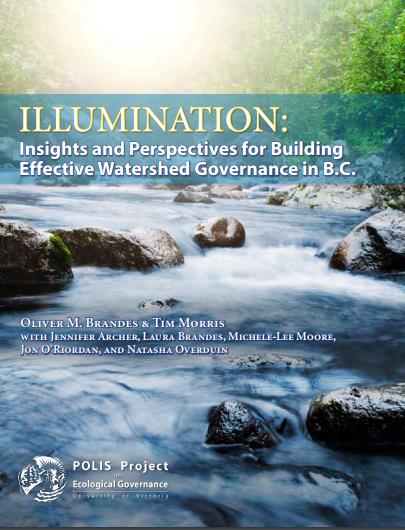NEW REPORT BY POLIS: Building Capacity for Watershed Governance in BC
Note to Reader:
Recently released by the POLIS Project, the research report Illumination: Insights and Perspectives for Building Effective Watershed Governance in B.C. is a forward looking and in-depth analysis of perspectives, emerging trends and opportunities associated with watershed governance and water sustainability in British Columbia. It specifically highlights capacity needs and practical tools required to implement watershed governance across B.C. but also shows a model for the legal and institutional evolution of water, watersheds and governance across Canada—and indeed globally.
New Research from the POLIS Project on Ecological Governance
 “British Columbia’s changing legal and governance landscapes offer the potential for significant shifts in water management and how decisions happen in the local context in the province and as a model elsewhere. The new Water Sustainability Act strengthens rules to protect water for nature, and enables innovative forms of local watershed governance and decision making,” says Oliver M. Brandes, Lead of the POLIS Water Sustainability Project.
“British Columbia’s changing legal and governance landscapes offer the potential for significant shifts in water management and how decisions happen in the local context in the province and as a model elsewhere. The new Water Sustainability Act strengthens rules to protect water for nature, and enables innovative forms of local watershed governance and decision making,” says Oliver M. Brandes, Lead of the POLIS Water Sustainability Project.
Oliver co-authored the report along with Tim Morris, Principal of Morris Consulting, with support from an interdisciplinary research team including Jennifer Archer, Laura Brandes, Michele-Lee Moore, Jon O’Riordan, and Natasha Overduin.
This research confirms that although a genuine window of opportunity exists to kick-start a world-class watershed governance regime in British Columbia, considerable knowledge and capacity gaps still exist into fully turning the concept into practice. Through an extensive investigation involving interviews, surveys, and a First Nations roundtable, the Illumination study provides critical insights into the question: “What is needed NOW to make watershed governance work in British Columbia?”
Key findings and insights offered in the report include:
- The current system is not working. Substantial appetite exists for a concerted move towards watershed governance—85% of e-survey respondents agreed that local watershed entities are needed to ensure B.C.’s new Water Sustainability Act is implemented to its fullest potential.
- Collaborative watershed governance is the future. Collaborative approaches are seen as critical for better decision-making.
- Watershed governance happens one step at a time. Multiple stages to collaborative watershed governance exist.
- Numerous capacity gaps revealed. Communities are seeking help and support to implement collaborative watershed governance.
- A catalyst is needed to spark action. A potential role has emerged for a province-wide capacity builder.
 “Decision-makers, communities, rights holders, licensor holders, and stakeholders cannot operate in silos,” says Natasha Overduin, Watershed Governance Project Manager and Research Associate with the POLIS Water Sustainability Project. “Rather, they must develop a collective, shared vision for their local watersheds and how to better manage resources for the benefit of users, local economies and nature to achieve long-term watershed health.”
“Decision-makers, communities, rights holders, licensor holders, and stakeholders cannot operate in silos,” says Natasha Overduin, Watershed Governance Project Manager and Research Associate with the POLIS Water Sustainability Project. “Rather, they must develop a collective, shared vision for their local watersheds and how to better manage resources for the benefit of users, local economies and nature to achieve long-term watershed health.”
To Learn More:
Download a copy of Illumination: Insights and Perspectives for Building Effective Watershed Governance in B.C.
Questions raised in Illumination will be the focus of the upcoming 1.5 day forum, “Watersheds 2016: Building Capacity for Collaboration and Watershed Governance in British Columbia” to be held in Vancouver, B.C. from September 30th – October 1st.
Watersheds 2016 panels and break-out sessions will share stories and lessons from existing collaborative, Indigenous-led, and local government-led initiatives and partnerships. Participants will engage in questions about what worked, what didn’t work, and how positive working relationships were created. For current or emerging leaders hoping to make a bigger positive impact in their home watersheds, this practitioner-oriented event offers a hands-on approach on how to improve decision-making around our most precious resource.



